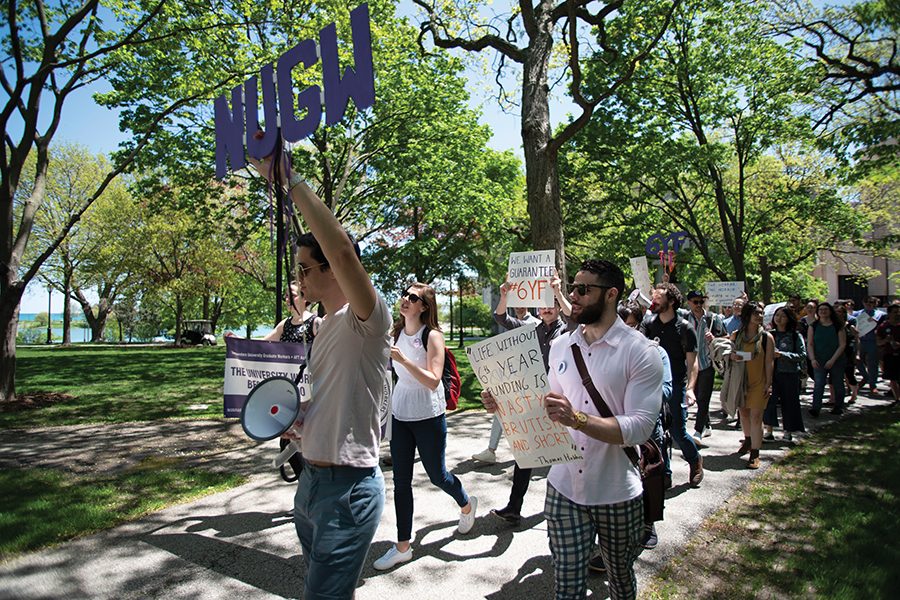Northwestern graduate workers participate in national Scholar Strike for racial justice
Colin Boyle/Daily Senior Staffer
Northwestern University Graduate Workers during a May 2019 march. Graduate workers joined a national strike this week to protest police and racial violence.
September 10, 2020
Northwestern graduate workers participated in a national Scholar Strike on Sept. 8 and 9 to protest police brutality and racial violence.
Given nationwide events of police violence — most recently the shooting of Jacob Blake in Kenosha, Wisconsin — University of Pennsylvania Prof. Anthea Butler created the strike for those in higher education to “no longer sit quietly” amid an intensification of police violence against black Americans.
“We believe that it is long past time for us to make a collective stand against police violence (particularly against communities of color) in the United States,” Butler’s statement read. “We will use this time as a public teach-in about police brutality and violence in our communities from both historical and contemporary perspectives.”
In the weeks following the death of George Floyd, NU administrators wrote to the community outlining strategies toward racial and social justice on campus. However, NUGW said the University has failed to follow through on the promises of “commitments to social justice” and assertions that NU “vehemently opposes anti-blackness.”
During the Scholar Strike, many NU graduate workers halted research activities, and those who teach their own courses or work as teaching assistants stopped preparing for fall classes. Others participated in national Scholar Strike virtual teach-ins — focused on abolition, anti-blackness and racial justice — and socially-distanced in-person conversations and workshops on abolition.
“When we are researching, when we are writing, when we are building syllabi, and when we are interacting with students in the classroom, we are working to dismantle white supremacy to create a more just academy,” NUGW said.
NUGW said many grad workers focused on amplifying and supporting the work of antiracist organizations, especially those working toward abolition. This includes a phone and email zap organized by NU Community Not Cops to pressure the University to follow through on a promise to disclose the University Police budget.
In a Thursday email to the NU community, University President Morton Schapiro wrote that the University has hired two consultants to conduct a review of UP — one on its community engagement and the other on its operations and policies, including a budgetary review.
“We acknowledge that we have only just begun and that some commitments will take much longer to fulfill. However, our dedication to systemic cultural change remains resolute,” the email read.
In an August community meeting, a University official recommended that Evanston residents concerned about off-campus students hosting parties or not wearing masks follow standard procedure for incidents that could jeopardize health and safety by calling the Evanston Police Department or UP.
NUGW said this instance is a perfect example of the ways in which policing and NU’s reopening plan are inextricably linked, and how anti-blackness is “at the center” of it all.
Using police to surveil students, NUGW said, shows the “hypocrisy” of the University’s “so-called” commitments to racial justice. Even assuming best intentions, NUGW said the University’s ties and deferment to the police pose a serious threat to the lives of black and other marginalized students.
“If NU actually wishes to eliminate anti-blackness on campus, it needs to sever ties with police, not increase police to further threaten the livelihood of students by exposing them to the coronavirus and the virus of racism that policing enforces,” NUGW said.
The Scholar Strike, NUGW said, highlights that this movement is not contained to NU, but rather is an academy-wide demand for racial justice and fair working conditions.
NU’s actions related to police divestment, its “dangerous” reopening plan and mistreatment of service workers “all show they do not care about racial justice,” NUGW added.
“They love to say ‘they see us’ and pay lip service to being committed to anti-blackness, but their policies continue to disproportionately harm black and other marginalized students,” NUGW said. “Solidarity means action, not empty words.”
Email: isabellesarraf2022@u.northwestern.edu
Twitter: @isabellesarraf
Related Stories:
— Students urge Northwestern to address issues of police divestment



